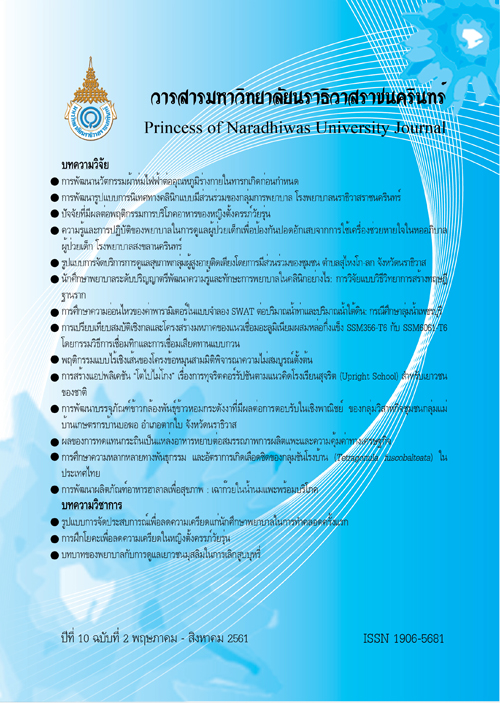The Creation of Anti-Corruption Application for Youth Based on the Concept of Upright School Project
Keywords:
Anti-corruption application, Corruption, Upright schoolAbstract
The objectives of this study were: 1) to study and create an anti-corruption application for the youth,
2) to assess the effectiveness of the anti-corruption application, and 3) to compare the learning achievements
before and after using the anti-corruption application. Sample was 43 secondary students (14 years old) in theirsecond semester of academic year 2016 at Anubannarathiwat School. Participants were selected by simple random sampling. The research instruments consisted of: 1) a structured interview for 15 representative teachers who attended the Upright School Project, 2) a learning management plan, 3) the anti-corruption application and 4) achievement tests after learning through the application. The research instruments were qualified for validity, yielding reliability of 0.90. Data were analyzed by using mean, standard deviation and t-test.
The content of the anti-corruption application were divided in 4 parts including discipline, loyalty,
living in contentment and public mind. Results were as follows: 1) global effectiveness of application was at
85.00/85.70, 2) learning achievement revealed that the post-test scores of using the anti-corruption application were statistically significantly higher than the pre-test scores (p < 0.05). It can be concluded that the anticorruption application for youth in accordance with the concept and objective of the upright school project in terms of the technology that creates educational innovation. It also enhances the accessibility of educational application-- anytime, anywhere without the learning limitations.
References
Brahmawong, C. (2013). Developmental Testing of Media and Instructional Package, Silpakorn University. Journal of Silpakorn Educational Research, 5(1), 7-20.
Bureau of Educational Innovation Development, Office of the Basic Education Commission, Ministry of Education. (2015). Upright School Project. Retrieved from http://www.uprightschool.com/. (in Thai)
Dennis, N.K. (2011). Development of a Blended Online Learning Approach Model for English for Careers in Technology at Ubon Ratchathani Rajabhat University. Thesis the Degree of Doctor of Philosophy, Department of English Language Studies, Suranaree University of Technology. (in Thai)
Ditsiri, T., & Sompong, N. (2017). Development of Application for Computer Tablet on Addition with Secrets of Mental Math Techniques to Enhance Fast Mathematics Calculation Skill of Prathomsuksa 6 Students, King Mongkut’s University. Technical Education Journal King Mongkut’s University of Technology North Bangkok, 8(1), 1-9.
Hwang, G.J., & Chang, H.F. (2011). A formative assessment-based mobile learning approach to improving the learning attitudes and achievements of students [Electronic version]. Computers & Education, 56, 1023–1031.
Internet Usage Statistics of Thai Population. (n.d.). Population Using the Internet. Retrieved from http://service.nso.go.th/nso/nsopublish/citizen/news/news_internet_teen.jsp. (in Thai)
Juntarasopon, T. (2016). Determining Dependent T-Test by using SPSS. Retrieved from http://stmath09.blogspot.com/2016/07/t-test-dependent-spss.html. (in Thai)
Leekitchwatana, P., (2013). Research Methods in Education. (8th ed.). Bangkok: Mean Service Supply. (in Thai)
Munmor, P. & Kamma, N. (2013). The Application of Thai Language Study for the Frist Year of Primary School Students. Thesis, Department of Computer, Faculty of Engineering, Rajamangala University of Technology Lanna, Tak Province. (in Thai)
Narathiwat Primary Educational Area 1. (2015). Information Services. Retrieved from http://www.pcrnara1.org/
DMC/.School list in Narathiwat Province. (in Thai)
Poochada, R., & Suramane, S. (2015). Development a Learning Application on Tablet Entitled ‘Elements of
Information System for Mathayomsuksa 4’. The paper presented at 1st Nation Conference On Technology and Innovation Management, Rajabhat Mahasarakham University, Mahasarakham Province, 132-138. (in Thai)
Reungsilp, K. (2013). The Development of Programmed Instruction On Word Compounding for Matthayomsuksa 1
Students at Taksinrachanusorn, Amphoe Moung Tak, Tak Province. Master’s Thesis of Arts in Thai language, Naresuan University. (in Thai)
Singdee, B., & Satpretpry, S. (2015). Resarch and Development of Application Instruction Media on Tablet
Android Operation System in Career and Technology Subject for Mattayomsuksa 1. Paper presented at the 15th National and International Research Conference (Proceedings) Graduate Students’ Network of North Rajabhat Universities, 623-634. (in Thai)
Surathamjanya, R. (2015). The Result of Using Application for Teaching English Vocabulary on Tablet in English Subject for Prathomsuksa 2 Students in Ratchaburi Educational Service Area 2. Master’s Thesis, Department of Educational Technology, Silpakorn University. (in Thai)
Thipsakulchai, B., & Jaiklaew, K. (2011). Corruption Perceptions Index 2015 Thailand was Ranked Number 76 of 168 Countries. Retrieved from https://thaipublica.org/2016/01/corruptionperceptionsindex- 2015-Thailand/. (in Thai)
Tiantong, M. (2004). M-Learning: A New Paradigm of E-learning, Sukhothai Thammathirat Open University. Journal of Education and Communication Technology, 1(1), 3-11.
Wijitwanna, S., Aungsuchod, S., Pinyopanuwat, R., Juimongsri, S. & Sirirunphan, C. (2013). Research for Educational Development. Bangkok: Charoendee Munkong Publishing. (in Thai)




